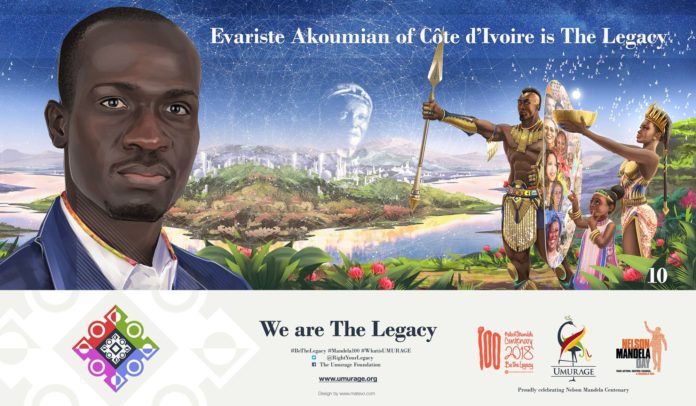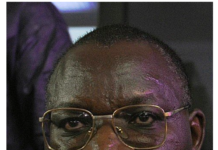Imagine electricity was so scarce in your country, Côte d’Ivoire, children could only do their homework with the light from candles, oil lamps or seating under street lamps. Imagine that, knowing a good education is an important factor to get out of poverty, this situation upsets you so much you decide to take this issue heads on. What solution will you bring to this problem that affects roughly 70% of your country’s and of the continent’s population?
Today, I am inspired by Evariste Akoumian from Côte d’Ivoire. Evariste Trésor Akoumian was born on September 15, 1981 in Agnibilékrou, a town 270 km north-east of the capital Abidjan, not far from the Ghanaian border.
After graduating from the Agnibilékrou Modern High School, Evariste moved to the capital to study law at the Felix-Houphouët Boigny University in Abidjan, the national university of Côte d’Ivoire founded in 1963.
After graduation, the young man decided for a career in the private sector. He immediately got a job in a company specializing in the retail of computer parts and a few years later, he set up his own shop in the same field.
His work led him to travel often to rural areas. One day, after a computer delivery to a nearby community, he was driving through a village after dark when he noticed children studying under the faint light of an oil lamp. Through his travels in the country, he had already noticed the lack of electricity coverage across the country, but there, he started seeing another angle to this problem: the hinderance of no access to electricity on the education of the children. And the negative impact on health and sight!
“I told myself that I had to help these children, find ways to make them autonomous. I found it unfair that they do not have the same opportunities as those who study in big cities. ”
The situation haunted him for days, as he wandered about his work. What solution could he really provide, one might wonder? He clearly had no way or means of solving his country’s energy crisis, but that’s not what he was looking for. He wanted a solution that would directly affect children, which could always allow them to have access to light, and this, effortlessly.
And then one day, he had an Eureka moment! Why not create a schoolbag with a solar panel that way each kid could generate their own power as they walked to and back from school?
“In Africa, we have plenty of sun, so why not think of way to use that source to help these children so they can do better in school?”
In 2016, the young man created a start-up, Solarpak. Luckily, a friend lent him some office space free of charge in the neighbourhood of Cocody, not far from the Faculty of Law where he studied a few years back.
Despite the savings on his rent, the project was going to consume all his savings and the profits of its IT business: it was to take him a whopping $ 76,000 – more than 30 million CFA francs – and more than a year of work before being able to place a first order of 500 school bags.
Each bag has a solar panel and a detachable lamp that can be powered on the battery by a simple USB cable. The solar panel is on the back of the back-pack, which allows effortless exposure to the sun as the kids walk to school. It takes about 30 minutes to charge the battery, and once it is fully charged, it can have an autonomy of 4 to 5 hours for the LED reading light.
The bags are not just utilitarian. Evariste paid close attention to having a child friendly design has it was likely that most children who would get it never had ‘real school bags’ to go to school:
“Children in rural areas also have the right to go to school with proper school bags and not bags that have been used to transport cocoa or rice! ”
The young man is a savvy entrepreneur – as evidenced by the fact that he had the reflex to patent his invention in more than 150 countries in the world – but Solarpak is above all a social enterprise:
“Our fight is not to sell this bag to the people. We are a militant company. We are not here for profit.”
Its main objective is to help children complete all their school requirements, of which homework represent a big part of. By offering them the lights they need to do their homework at night, without depending on an oil lam shared by the whole family, Evariste is confident his invention increases their chances of getting their degree and later on, a decent job.
“Don’t these children have the right to succeed?”
Evariste walks the talk: he donated 200 of his first batch of 500 bags to schools of in the periphery of Abidjan where there is no electricity.
You might be asking yourself: is he a philanthropist with deep pockets? No of course, I would have told you so. So how will he expand his business if he gives away all his bags for free?
Well, his idea is to seek partnerships with institutions that promote primary school education so they can help him reach as many children as possible.
To that end, he practically became an ambassador of his brand, reaching out to government departments, NGOs, the United Nations agencies. His invention was rapidly adopted and his new found partners helped him increase his reach.
The tech-entrepreneur does not intend to limit himself to Coote d’Ivoire as he knows the lack of access to electricity is a problem that affects the entire African continent.
What he didn’t expect however is that his invention would attract buyers overseas in places he never thought would have heard of his country, let alone of him, Evariste Akoumian. One of these exotic places: Haïti – yes you read well, Haiti, land of Toussaint Louverture and the Fugees! Earlier this year, in March, Evariste was invited by the Ministry of National Education and Vocational Training of Haiti to present his bag. With the support of UNESCO Office in Port-au-Prince, He donated 1,000 school bags to our distant cousins of the Caribbean.
This was a major milestone, not only for his company, but also from a historical perspective:
“Though this country has suffered a lot in its recent history, we have to recognize that it has contributed to the emancipation of many black people around the world.”
As you can imagine, our young inventor won several competitions and received prizes that can only encourage him in this path he chose. Shortly after creating Solarpak, Evariste received the 1st prize in the competition of the French-speaking Global Social Venture Competition (GSVC) in Paris and was one of the finalists of the American Edition of the GSVC contest. The GSVC gives students and recent graduates the opportunity to turn their ideas into concrete projects to address the most pressing social and environmental issues.
Evariste also received a Social Entrepreneur of the Year award from the Orange Foundation, and was awarded by the 3535 Association the Francophone Youth 35.35 Award . The Association 3535 is a non-profit that honours each year 35 young Francophones under the age of 35 with outstanding achievements in their communities.
This year, a mere two years since he launched his company, Evariste received the Award of Merit at the Africa Expansion Forum in Montreal and was one of the winners of the 2018 African Prestigious Awards. He was also a finalist in the 2018 African Talent Awards.
Evariste’s goal is to reach 10 million schoolchildren around the world. Before that, he has another goal he hopes to reach as soon as possible: make his bags in Côte d’Ivoire instead of having to order them in China. With a local factory, Evariste will not only help children study in a more serene environment, but he can also create jobs for their parents.
“I want young people to believe in themselves, to always move forward, to live their dreams. Nothing is impossible to those who believe. If you have a dream, you have to make sure it comes true.”
Right Your Legacy, Evariste! #BeTheLegacy #WeAreTheLegacy#Mandela100 #WhatisUMURAGE
Contributors
Um’Khonde Habamenshi
Lion Imanzi
































































